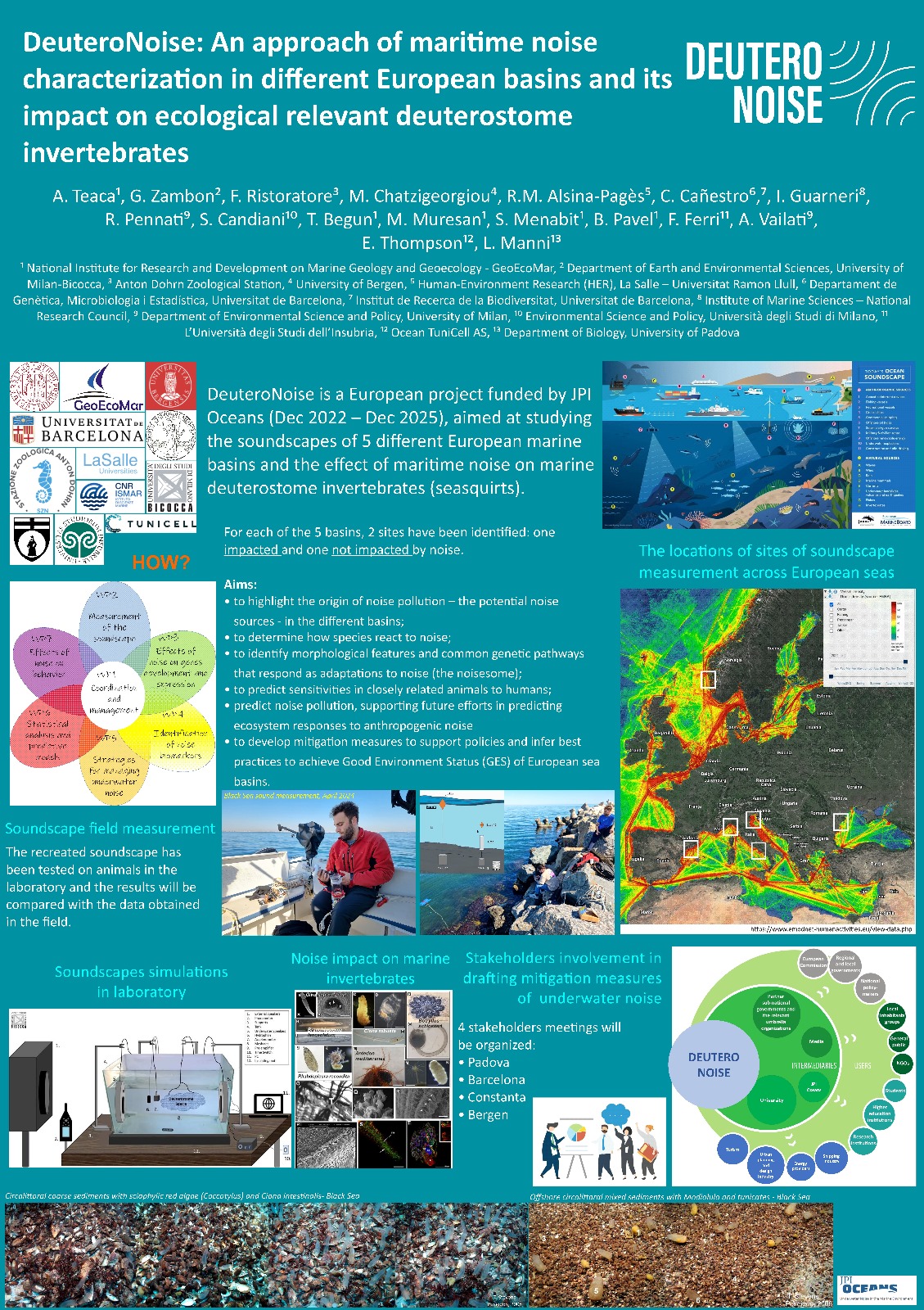Proiecte
ERANET-JPI-OCEANS-Characterization of maritime noise in different european basins and its impact on ecological relevant deuterostome invertebrates (DeuteroNoise)

| Responsabil: | Dr. Adrian Teaca, CSI |
| Coordonator: | Lucia Manni, University of Padua (Italy) |
| Beneficiar: | GeoEcoMar |
| Finanțator: | Program 5.8 - European and INternational Cooperation, subprogram 5.8.1 - Horizon Europe, ERANET |
| Schema de finanțare: | ERANET |
| Durata: | 27 months |
| Data începerii: | 01.03.2024 |
ERANET-JPI-OCEANS-Characterization of maritime noise in different european basins and its impact on ecological relevant deuterostome invertebrates (DeuteroNoise)
Among noise sources, maritime traffic is of relevance on animal wellness, although its impact is little known in many European sea-basins. To date, there has been an almost exclusive focus on vertebrates, in which noise involves the mechanoreceptor cells of the ear and can cause hearing impairment or deafness. Homolog cells have been discovered in tunicates, marine invertebrates closely related to vertebrates, thus opening the question on their ability to sense and be affected by noise. Tunicate mechanoreceptors sense sound waves and particle movement and are predictable targets of noise pollution. DeuteroNoise aims to characterize the noise pollution caused by maritime traffic (also using simulations) in selected sites of the North Adriatic Sea, Lagoon of Venice, North Sea, Black Sea, and Barcelona shore, and test its effects on behavior, nervous system and sensory organs, immune system, and resilience in marine invertebrates closely related to vertebrates (deuterostomes): hemichordates, echinoderms, cephalochordates, and tunicates. These animals are common in European seas and cover different levels of the trophic network, from the holoplankton-meroplankton to sessile or sedentary primary consumers. Noise level will be detected on site and simulated in the laboratory. A behavioral, morphological and genetic survey will be conducted on sampled animals living in polluted vs non-polluted areas. Moreover, animals will be exposed to noise in laboratory-controlled conditions to verify its effect on larval, juvenile and adult stages at individual level and over generations. Comparative studies will allow us to: highlight causes of noise pollution in the different basins; determine how species react to it; identify its genetic and morphological signatures; predict sensitivities in closely related animals that cannot easily be studied in laboratory or on-site; predict noise pollution and infer the best practices to reach the Good Environment Status of European basins.
DeuteroNoise is an international collaborative and interdisciplinary project whose main goal is to contribute to reach the GES of European seas and oceans, within the MSFD Director 11, by characterizing noise pollution caused by maritime traffic in selected sites of the North Adriatic Sea, Lagune of Venice, Barcelona shore, North Sea, and Black Sea, and testing its effects on animal behavior, nervous system and sensory organs, immune system, and resilience in MIDs.
To reach this goal, the consortium, formed by a team of experienced researchers from several countries and with diverse backgrounds, will undertake a comprehensive analysis of noise level caused by maritime traffic in the selected sites and will analyze from different points of view a panel of ecological relevant invertebrate species. Information and data generated in this project will contribute to building mathematical links in the form of a multiscale model, able to simulate noise pollution and guide decisional policies to reach the GES.
Work Packages (WPs) with specific objectives and tasks will be dedicated to distinctively develop a holistic approach by combining field data with laboratory experiments.
Results:
- Obtaining data in collaboration with international partners regarding the noise resulting from maritime traffic in noise-polluted areas and non-polluted areas (marine protected areas).
- Obtaining laboratory data, in collaboration with international partners, regarding the impact of noise on the behavioral changes of marine invertebrates.
- Map of interested stakeholders.
- Technical recommendations regarding the mitigation of noise produced by maritime traffic.
- Stakeholder involvement in the decision-making process on the noise mitigation measures needed to reach the SEB (D11) of European sea basins.
